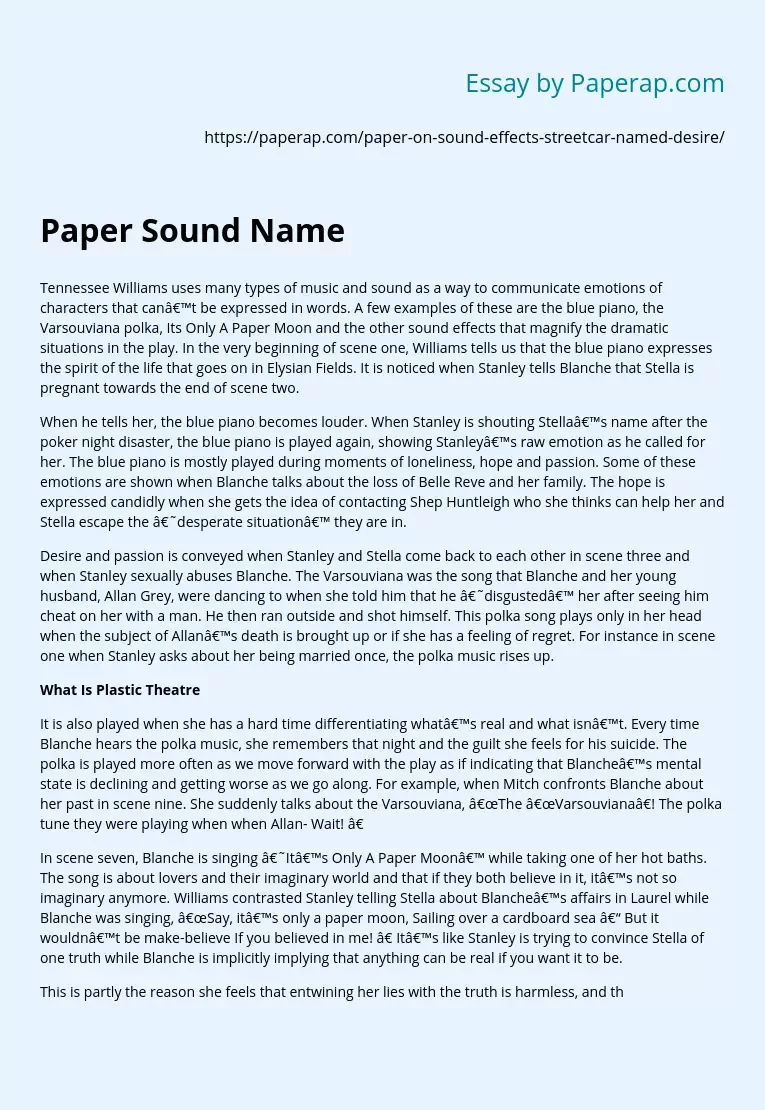What Is Plastic Theatre
Tennessee Williams uses many types of music and sound as a way to communicate emotions of characters that can’t be expressed in words. A few examples of these are the blue piano, the Varsouviana polka, Its Only A Paper Moon and the other sound effects that magnify the dramatic situations in the play. In the very beginning of scene one, Williams tells us that the blue piano expresses the spirit of the life that goes on in Elysian Fields. It is noticed when Stanley tells Blanche that Stella is pregnant towards the end of scene two.
When he tells her, the blue piano becomes louder. When Stanley is shouting Stella’s name after the poker night disaster, the blue piano is played again, showing Stanley’s raw emotion as he called for her. The blue piano is mostly played during moments of loneliness, hope and passion. Some of these emotions are shown when Blanche talks about the loss of Belle Reve and her family.
The hope is expressed candidly when she gets the idea of contacting Shep Huntleigh who she thinks can help her and Stella escape the ‘desperate situation’ they are in.
Desire and passion is conveyed when Stanley and Stella come back to each other in scene three and when Stanley sexually abuses Blanche. The Varsouviana was the song that Blanche and her young husband, Allan Grey, were dancing to when she told him that he ‘disgusted’ her after seeing him cheat on her with a man. He then ran outside and shot himself.
This polka song plays only in her head when the subject of Allan’s death is brought up or if she has a feeling of regret. For instance in scene one when Stanley asks about her being married once, the polka music rises up.
It is also played when she has a hard time differentiating what’s real and what isn’t. Every time Blanche hears the polka music, she remembers that night and the guilt she feels for his suicide. The polka is played more often as we move forward with the play as if indicating that Blanche’s mental state is declining and getting worse as we go along. For example, when Mitch confronts Blanche about her past in scene nine. She suddenly talks about the Varsouviana, “The “Varsouviana”! The polka tune they were playing when when Allan- Wait! ”
In scene seven, Blanche is singing ‘It’s Only A Paper Moon’ while taking one of her hot baths. The song is about lovers and their imaginary world and that if they both believe in it, it’s not so imaginary anymore. Williams contrasted Stanley telling Stella about Blanche’s affairs in Laurel while Blanche was singing, “Say, it’s only a paper moon, Sailing over a cardboard sea – But it wouldn’t be make-believe If you believed in me! ” It’s like Stanley is trying to convince Stella of one truth while Blanche is implicitly implying that anything can be real if you want it to be.
This is partly the reason she feels that entwining her lies with the truth is harmless, and that as long as it sounds better than the truth, it wouldn’t hurt anybody. The trumpet and drums are heard in situations that are slightly theatrical. For example when Stella says, “It will happen! ” And impulsively kisses Blanche about her and Mitch getting together. Another important moment it comes up is in scene ten, when Stanley sexually abuses Blanche: “The hot trumpet and drums from the Four Deuces sound loudly. ”
Plastic theatre is when the playwright uses props, sound and stage directions to show the experiences that the characters have gone through. In Blanche’s case, Williams uses the Varsouviana polka as a way for Blanche to vividly remember the night of Allan’s suicide. The polka tune also brings up feelings of regret that Blanche has about her actions of the time she stayed at the Flamingo Hotel. This is shown when Stanley gives her the bus ticket for her to go back to Laurel. An additional sound as plastic theatre are the ‘inhuman jungle voices’ that Blanche hears in scene ten and eleven.
The voices convey her feeling in the situations the voices are heard. One of them is when Stanley is advancing towards her and she feels like an animal trapped in a corner. She feels like she is the prey and Stanley or the matron is the predator trying to catch her. The locomotives represent Stanley and his desire to bring down Blanche. Every time there is a discovery of Blanche’s embarrassing and shameful past through Stanley, the sound of a locomotive is present. When he overhears what Blanche really thinks about him, a locomotive is also present.
Locomotives give out strong, dominating sounds, which mirror Stanley’s character. Therefore, without the blue piano, the Varsouviana or Williams’ use of plastic theatre and juxtaposes, the play wouldn’t seem so dramatic. The polka exaggerates Blanche’s declining mental state and makes the audiences emotions for her change from disrespecting her for her promiscuous past to sympathy because its not entirely her fault. In my opinion, I find Stanley’s dialogue juxtaposed with Blanche’s singing in scene seven the most intriguing use of music and dialogue compared to the others.
What Is Plastic Theatre. (2019, Dec 05). Retrieved from https://paperap.com/paper-on-sound-effects-streetcar-named-desire/

